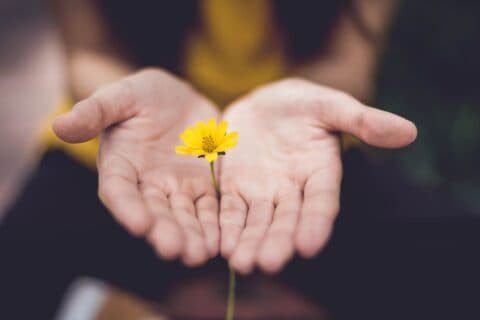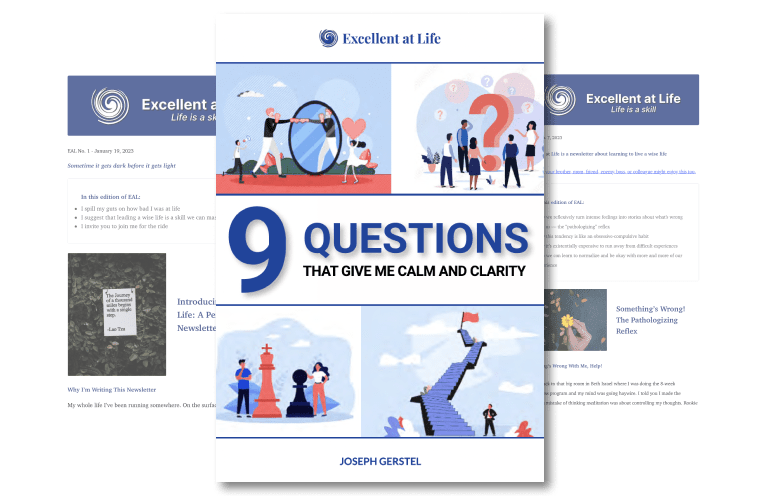The Cultivation of Okayness
Last we chatted I was talking about how we can learn to be okay with whatever is here, how we can “normalize” the full range of our experience. I like to call this the cultivation of okayness. Okayness means that whatever I am experiencing now is okay. It’s something I can learn to meet gently, something I can stop fighting.
I’m shaking and my heart is pounding as I get up to speak publicly? That’s okay. Someone’s really angry at me and my face is red with shame? It’s okay. I’m overcome with relief and about to cry in the barber’s chair? That’s okay too. (I spared the barber, but probably because I’m still embarrassed and don’t have the guts… yet.)
I’ve come to see that it doesn’t matter why something is happening — I don’t need to know the causal history of this reaction, this difficult feeling, and I don’t need to go lie on Freud’s couch in order to work with it. Pursuing the historical why is actually a distraction, a further attempt at avoidance. (Freud’s couch as the avoidance mechanism itself, eh? I’m getting kicks out of pulling a Freud on Freud.)
I just have to be willing to feel it, willing to get to know it experientially, somatically. I need to be willing to give it permission to arise, permission to be. I need to let go of the identity that says I’m not the kind of person who shakes in public, who cries randomly, or who feels shame about something I did. This is what’s here, how can I be a little more okay with it?
Ever got a hug from someone that gave you permission to cry or gave someone else a hug like that? That granting of permission to what is bubbling up and the internal shift it engenders is what I’m talking about. This is okay to feel. It is okay for this to be here. It’s a kind of surrender, an allowing, an affective rotation of sorts, a melting into experience, whatever that experience may be.
Honestly, I feel like I am insulting the power of this shift in mindset by even attempting to communicate it to you over an email. I wish you could feel how much this has changed my life.
Resisting Experience: What Are You Unwilling to Feel?
This time I was sitting in the prayer hall of a Jewish retreat center near Baltimore on a New Year’s meditation retreat with Tara Brach. The only sound in the silence was the dissonance of the Hebrew verses decorating the walls clashing with the Buddha statues placed at the front of the room. It was rather jarring to my Jewish ears.
Tara shared a teaching on that retreat which over time I’ve realized may be the most profound teaching I’ve ever heard.
A famous guru sits on top of a mountain. The guru is said to hold the secret to lasting happiness. People travel from all over the world to hike up the mountain and hear it and so you decide to as well. You reach the top of the mountain and the old guru beckons you to bend down and whispers in your ear:
“What are you unwilling to feel?”
We each have a range of feeling we’re willing to encounter. We push the rest out of consciousness and avoid it like the plague. It is this resistance to what is that generates all the angst in our lives. Say, I’m worried. I don’t want to be worried. So I suppress it, I ruminate endlessly about it, I distract myself on my phone, with food (I loooove pastries!), or with countless other inventive ways.
But it comes at a cost. Here’s Carl Jung on the cost:
Until you make the unconscious conscious, it will direct your life and you will call it fate.
The things you avoid rule your life. They control your behavior, cloud your vision, and pollute your relationships. Avoidance is expensive.
It took me a long time to realize that trying to fix, trying to make things go away, would never work.
The Opposite of Resistance: Willingness to Experience
These past few years I’ve been exercising a pivot, a U-turn back into the thick of things, into my own heart. Instead of running away all the time when I’m feeling something unpleasant, I turn towards. I feel stuff. I stay with the chaos. I call it friend. I allow the guests to stay.
Cultivating okayness requires us to expand our “willingness to experience.” We must learn to be okay with strong feelings, chaotic sensations, fear, shame, loss, sorrow, jealousy, and hundreds of other nameless, but challenging, feelings and sensations.
It takes practice and skill to do this, like building a muscle, and it’s taken real commitment because there’s a price to pay. The price is letting everything I’ve pushed out of my consciousness back in so it can resolve itself. Now don’t go doing that all at once — it’s a slow, incremental process, gently pushing the edge one tiny bit at a time.
The trauma of being human means that we all carry with us all kinds of emotional baggage. Even if our lives were always wholesome, the mere precariousness of existence — the fact that we will die, that we age, lose loved ones, that we have no control over the most important things in our lives — is more than enough to generate terror and grief so powerful that unless we are really skilled, we permanently exile it from consciousness.
Each of us holds unresolved feelings over roads not taken, life mistakes we made, unsuccessful relationships (or even successful relationships that require saying no to the rest of the world), people we lost, our own aging and eventual death. I’m not that old, but I can see myself aging. I don’t want to get old. I don’t want to die. But even Charlotte can’t protect Wilbur forever — everyone dies.
And who’s life was always wholesome anyway? In addition to the trauma of existence, each of us has experienced the many thousands of smaller traumatic incidents that are part of an “ordinary” life. From the anger of an impatient adult to the bullying on a school playground or even the rejection from a school we really wanted to go to.
And many of us have suffered far more, whether by commission or omission, abuse or neglect. I certainly experienced enough to cause me to hide myself away for my whole life. If the rest of humanity hasn’t, why are we all pretending all the time?
Our psyche is riddled with the unresolved litter of experience and as we developed, we lacked the insight and skill to allow these feelings to be known and felt and so we banished them. Familial or social conventions further limited what we could experience without feeling ashamed and over time we internalized these conventions and labeled anything we did not see others manifest as “not normal.” Thus was planted the seed of thinking there’s “something wrong with me” because you feel a difficult emotion or an amorphous sensation or aren’t following some dysfunctional social convention.
Cultivating okayness means learning to normalize all of this. To delicately begin to allow it to bubble up and to practice holding it with the most gentle attention.
Okayness is Kind Of, Sort Of, Mindfulness
Honestly, okayness is sort of another name for mindfulness, but I like it better because for me it captures the self-befriending quality of what I’m up to. It also helps me avoid the here’s-another-tool-to-fix-myself trap. I am trying to befriend experience, to meet it with a kind, patient, even maternal attention — like holding a little baby. I am trying to expand the range of what I allow myself to feel and incrementally teach myself this is okay, this is okay too, and even this is okay.
The ocean waves. Our minds think. Our bodies feel.
Pleasant. Unpleasant. Easy. Difficult.
It’s all okay.
Joseph



